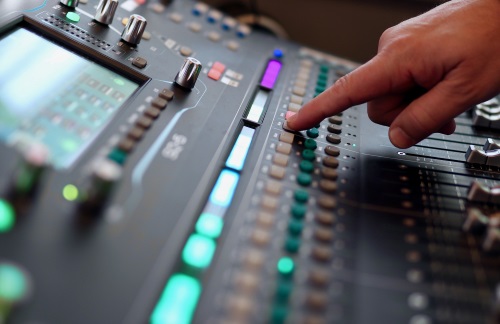It’s not surprising that analog consoles remain in use because of the hat trick that they’re paid for, they’re in place, and operators are used to working with them. Used analog desks also cost a fraction of their original price.
However, modern event production is growing used to the benefits of digital mixers. Here are some reasons why digital consoles win the day in today’s productions.
In the digital world – where outboard dynamics, effects and EQ are built into the desk, and loudspeaker processing and amplifiers are being combined with, or built into, loudspeakers – the mixing board is the easier of the two to replace, while the loudspeaker system can be incrementally upgraded one zone, speaker, amp or processor at a time.
Many artists’ engineers travel with their own desk, even when the entire sound system isn’t being carried, as it provides consistency and comfort. The ability to quickly have a show ready, with only loudspeakers needing to be EQ’ed before soundcheck, means load-in can start later, freeing time for other appearances and travel the day of show.
Those that don’t travel with their own console can email a file from a previous appearance with that make of digital mixer, or build a file using the manufacturer’s offline editor. Just using a console’s editor allows engineers to familiarize themselves with a new desk.
Multi-band shows can be as effortless as peeling off stacked backline and moving a few XLRs, which takes longer than recalling the correct console scene. “Charting” consoles or using separate inputs becomes unnecessary. When sharing inputs, the next act’s settings are recalled faster than the previous band’s gear can be carted off the stage.
Saving scenes for acts or events that repeat regularly, especially when there are multiple events in a day, makes it easy to quickly set up and get soundchecked when time is short, perhaps even after the support act or the wedding. Acts that return regularly can afford to skip soundcheck, allowing them to arrive later in the day, a great benefit when they must travel long distances.
Custom input libraries for a venue’s microphone inventory speed and simplify programming. Writing and storing specific settings for the house mics allows sound check to get started in a few minutes by inserting the right files in the corresponding channels, even by a less experienced engineer.
Application-specific settings for dynamics and effects also make it easier to program a digital console. Meaningful, logical names for library settings – like “Kick Gate,” “Vocal Comp” and “Snare Verb” – can make it simple to find and load a file for a gate, compressor or reverb that is pre-tweaked for a particular application.
Output EQ for specific combinations of house loudspeakers and vocal mics (and even music style) can make the chore of tuning the mains and monitors much easier.
Each vocal mic and wedge combination benefits from particular output EQ settings. The same vocal mic with a double wedge would require more drastic cuts than a single wedge.
Output EQ for the main loudspeakers often needs to be adjusted for different types of music, especially for different levels of SPL. Settings like “Double Wedge 58” or “Reggae Mains” can save time before every show.
The great asset of early digital effects was their powerful library of presets. Though most desks have libraries, one common shortcoming is a lack of meaningful scenes that can be quickly recalled.
Generic “festival” scenes for different types of bands can make it easy to get a band’s sound check started, rather than starting from scratch with a zeroed desk.
Just having the inputs named, initial input gains, EQ, dynamics and effects loaded saves time, and the time spent tweaking those settings can result in a better mix. A simple four-piece of drums, bass, guitar and keyboard setup with a vocal input for each musician could save an hour.
Templates for particular events, whether they be panel discussions, praise band rehearsal, karaoke or wedding receptions can relieve your lead engineer from having to be at every function in the building.
The ability of every staff member to call up a preset and get a couple mics and a playback source to work can help better utilize a facility outside of weekend “prime time” hours.
Security features that lock out certain functions can keep a console from being intimidating or dangerous in the hands of novice engineers. Remote monitoring or control of console by a technical manager or outside vendor can help with troubleshooting in the case of an emergency, perhaps saving an on-site call.
As the benefits pile up, it seems inevitable that your next purchase could be a digital console.















